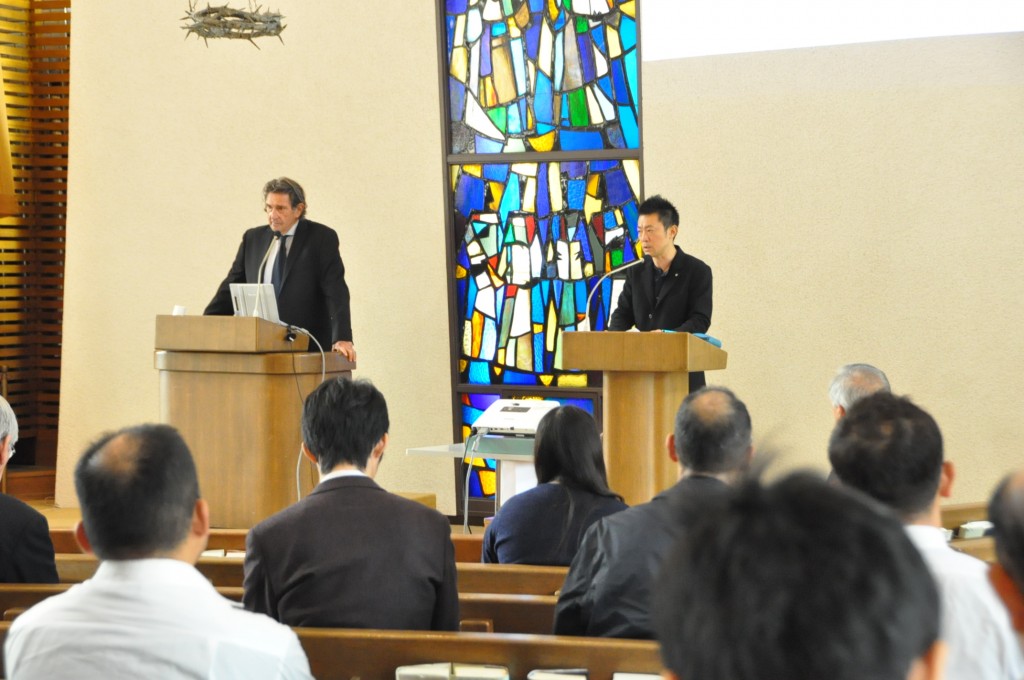Center for Interdisciplinary Study of Monotheistic Religions(CISMOR)Doshisha University
> Public Lectures > Cross-Cultural Aspects of Reconciliation: Psychological Features Affecting the Israeli-Palestinian Relations and the Path to Peace in the Middle EastPublic Lectures
Cross-Cultural Aspects of Reconciliation: Psychological Features Affecting the Israeli-Palestinian Relations and the Path to Peace in the Middle East
| Date: |
2016/11/20 13:00-14:30 |
|---|---|
| Place: | Divinity Hall Chapel, Imadegawa Campus |
| Lecture: | Professor Arie Nadler (School of Psychological Sciences, Tel Aviv University) |
| Summary: | |
|
In “The Psychological Dimensions of the Middle East Peace Process,” Prof. Nadler focuses on three key points that could potentially lead to reconciliation through cultural merging. First, he delved into the history of the Israeli Palestinian conflict. Secondly, he examined the psychological tension/competition that can occur between the perceived narrative and the perceptions of victims. Thirdly, he explored the cross-cultural effects of experiencing war and reconciliation. Palestinian and Jewish people have coexisted in the territory located between the Jordan River and the Mediterranean Sea. The present day Israeli Palestinian conflict can be traced back to 1947 when the UN General Assembly decided to partition Palestine and adopted this plan as Resolution 181. This political decision triggered several wars that involved various Middle Eastern nations. Fighting occurred on four occasions in addition to the Palestinian liberation organization which planed various activities that led toward independence. Nevertheless, to this very day there is little hope for the conflict resolving itself. Their conflict of interests can be analyzed from a historical or a political standpoint. But in this lecture Prof. Nadler focused particularly on the psychological dimensions that are just as important. Prof. Nadler feels that military maneuvers threaten the security and resources of locals and in some cases may even destroy the livelihood of residents. However, these conflicts are difficult to resolve because one tends to blame one’s opponent while legitimizing one’s own position. The situation is exacerbated when the group that one belongs to states that they are absolutely right while the opposition is regarded as completely wrong. When such extreme views are incorporated into the educational system, it is difficult to understand each other, and the hope of conflict resolution is significantly reduced. Prof. Nadler offered his views on the victim mentality and explained how these ideas might be used as a means toward conflict resolution. A few years ago when he held a seminar on“global conflicts,”at Tel Aviv University, a Jewish student described the holocaust and the Zionist movement in detail. Similarly, Palestinian students talked about the suffering their relatives experienced in 1948. Neither side seemed to be able to recognize the suffering of the other group, since they were both driven by the victim mentality. Their own cause was absolute and it legitimized the existence of their state. One often sees groups, nationalities and ethnicities arguing over the question of who are the true victims. Whenever there are conflicts, there is a tendency to rationalize one’s own position as absolute. According to Prof. Nadler, by adopting the victim mentality, one actually develops less empathy toward the other. In fact, one tends to view the world only in terms of “being victimized.” Another phenomenon that he observed has to do with how each group regards history. Since each group harbors much animosity, anything done to the enemy can be seen as legitimate. It is as if these groups are trying to compete against each to get others to recognize that “they are the true victims.” This reduces the possibility of reconciliation and is extremely unproductive. Prof. Nadler offered two solutions to the problem of victimization. First, people need to abandon the idea that they alone are the victims while the other group is the aggressor. Instead, both groups should recognize that they each played the role of the aggressor and victim. The second method is to try to understand one’s opponents. One also has to recognize that the concept of “peace” for example can be interpreted in different ways depending on one’s culture. In Europe, war and peace tend to be viewed as polar opposites, but in other cultures, war and peace occur in progression in stages. Prof. Nadler concluded his lecture by emphasizing the need to recognize conceptual differences. By observing the two methods that he mentioned above, Prof. Nadler hoped that the two ethnic groups could resolve the harmful interpretations of their pasts. Translated by Jonathan Augustine (Ryukoku University) |
|
|
*Admission Free, No Reservation Necessary. *Lecture in English , interpretation will be provided. |
|
|
20171120poster |
|

